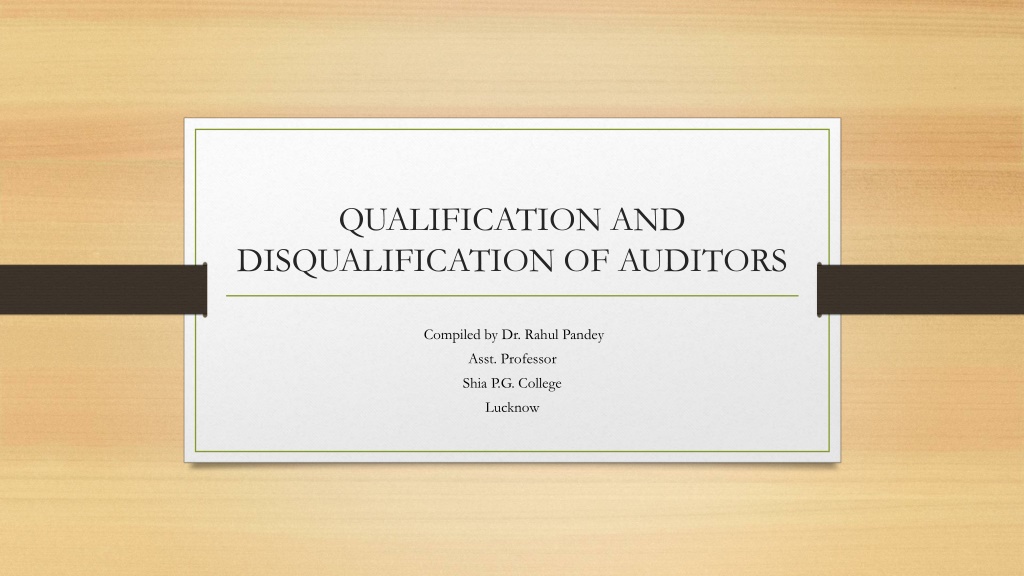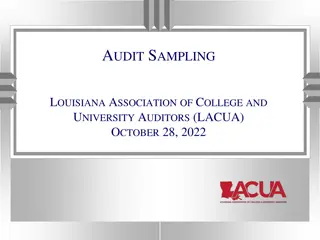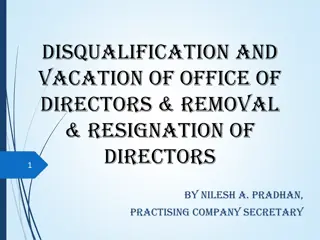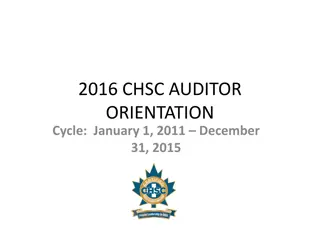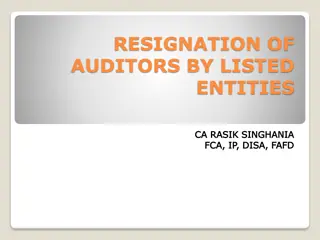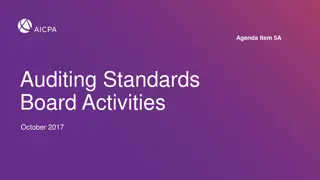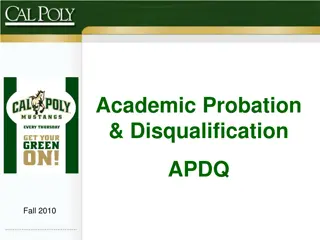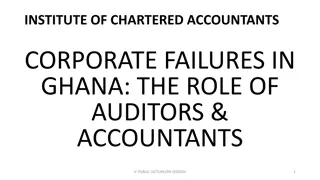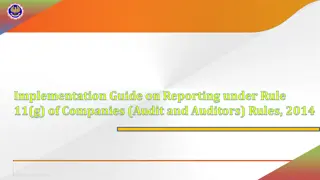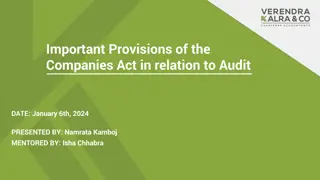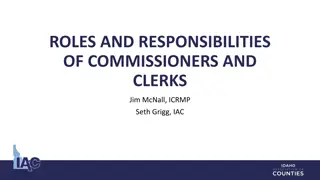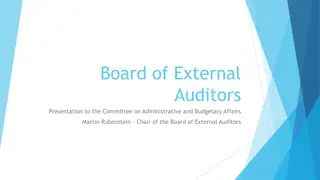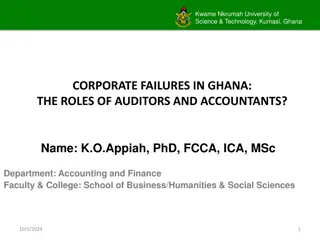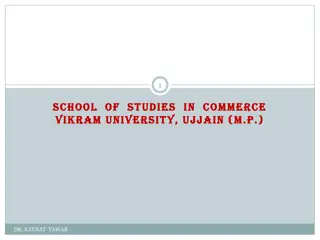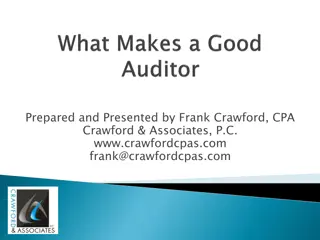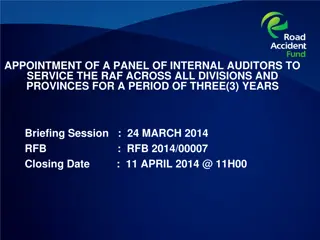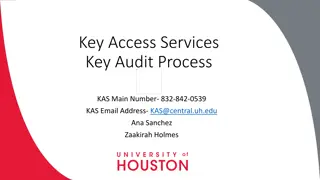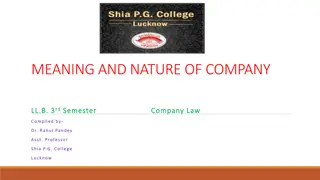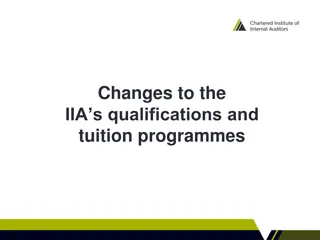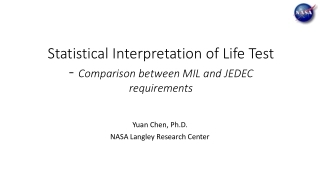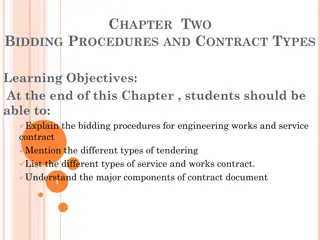Qualification and Disqualification of Auditors in Company Law
A detailed overview of the eligibility criteria, qualifications, and disqualifications for auditors as per Section 141 of the Companies Act, 2013. It covers the requirements for appointment, restrictions on rendering certain services, holding interests in the company, indebtedness limits, business relationships, and more. The information emphasizes the importance of ensuring independence and impartiality in auditing practices.
Download Presentation

Please find below an Image/Link to download the presentation.
The content on the website is provided AS IS for your information and personal use only. It may not be sold, licensed, or shared on other websites without obtaining consent from the author. Download presentation by click this link. If you encounter any issues during the download, it is possible that the publisher has removed the file from their server.
E N D
Presentation Transcript
QUALIFICATION AND DISQUALIFICATION OF AUDITORS Compiled by Dr. Rahul Pandey Asst. Professor Shia P.G. College Lucknow
QUALIFICATION AND DISQUALIFICATION OF AUDITORS (Section 141) Eligibility. A person shall be eligible for appointment as an auditor of a company only if he is a chartered accountant [Section 141(1)]: Provided that a firm whereof majority of partners practising in India are qualified for appointment as aforesaid may be appointed by its firm name to be auditor of a company. Qualification. Where a firm including a limited liability partnership is appointed as an auditor of a company, only the partners who are chartered accountants shall be authorised to act and sign on behalf of the firm [ Section 141 (2) ]. Disqualifications. [Section 141(3)]. The following persons shall not be eligible for appointment as an auditor of a company, namely- [ SOURCE/CREDIT : Elements of Company Law, N.D. Kapoor. Sultan Chand and Sons (P) LTD.] The Companies Act, 2013 (BARE ACT)
a) A person who, directly or indirectly, renders any service referred to in Section 144 to the company or its holding company or its subsidiary company [ Amended by the Companies (Amendment) Act, 2017]. b) An officer or employee of the company; c) A person who is a partner, or who is in the employment, of an officer or employee of the company; d) A person who, or his relative or partner- (i) is holding any security of or interest in the company or its subsidiary, or of its holding or associate company or a subsidiary of such holding company, provided that the relative may hold security or interest in the company of face value not exceeding Rs. 1,000 or such sum as may be prescribed;
(ii) Is indebted to the company, or its subsidiary, or its holding or associate company or a subsidiary of such holding company, in excess of such amount as may be prescribed; or (iii) Has given a guarantee or provided any security in connection with the indebtedness of any third person to the company, or its subsidiary, or its holding or associate company or a subsidiary of such holding company, for such amount as may be prescribed; (e) a person or a firm who, whether directly or indirectly, has business relationship with the company, or its subsidiary, or its holding or associate company or subsidiary of such holding company or associate company of such nature as may be prescribed;
(f) A person whose relative is a director or is in the employment of the company as a director or key managerial personnel; (g) a person who is in full-time employment elsewhere or a person or a partner of a firm holding appointment as its auditor, if such persons or partners is on the date of such appointment or reappointment holding appointment as auditor of more than twenty companies; (h) a person who has been convicted by a court of an offence involving fraud and a period of 10 years has not elapsed from the date of such conviction; (i) Any person whose subsidiary or associate company or any other form of entity is engaged as on the date of appointment in consulting and specialised services as provided in Section 144.
Where a appointed as an auditor of a company incurs any of disqualifications mentioned in sub-section (3) after his appointment, he shall vacate his office as such auditor and such vacation shall be deemed to be a casual vacancy in the office of the auditor [Section 141]. [ SOURCE/CREDIT : Elements of Company Law, N.D. Kapoor. Sultan Chand and Sons (P) LTD.] The Companies Act, 2013 (BARE ACT)
